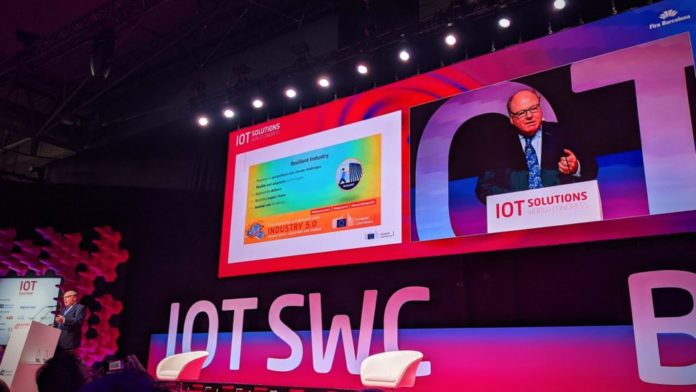The first plenary session at IoT Solutions World Congress (IOTSWC) in Barcelona last week saw an address by the European Commission about Industry 5.0. Say what? Industry 5.0? What about Industry 4.0? Are we done with that already? Are we finished with this process of industrial automation and intelligence? I mean, how many smart factories are there, really? What about the fourth industrial revolution, only a decade old? Are we really onto a fifth?
Well, no; and the European Commission is not about to suggest lights-out manufacturing has come to pass. But it has a beef with the Industry 4.0 concept, on the grounds it is too-much about tech and money, and too-little about people and the planet. What-with geopolitical crisis and environmental armageddon, it is time to put pressure on hard-nosed industry, the argument goes – as the dirty engine of the global economy – to do better.
Otherwise we may as well throw in the towel. That is the gist of the call-to-action that opened IOTSWC, this minor Barcelona showcase, which works like a cult act in the big tech roadshow and a curtain-raiser for the MWC monster-mash on the same site at the end of the month (February 27 – March 2). The point is the old Industry 4.0 agenda, at one time just about the local economy, is now at the centre of regional policy on sustainability as well.
But it requires some tweaking to make it complicit with broader societal pressures, and to engage the private sector more strategically with them. Séan O’Reagain, directorate general for research and innovation at the European Commission, and also deputy head of its ‘Industry 5.0’ unit, told IOTSWC that a storm of macro-economic issues, exposed by global pandemic and war in Ukraine, and manifest in supply chain failures, make Industry 4.0 deficient.
Or “not sufficient”, at least. “Digitalization of industry based solely on productivity improvement is not sufficient,” said O’Reagain. Plus, there is the environment to think of, of course. Europe has signed up to the last-ditch scramble to solve the challenge of sustainable and equitable living by 2030. In this context, the European Commission’s Industry 5.0 agenda makes sense – as an aspirational marketing brand to promote Industry 4.0 with-a-conscience.
O’Reagain said: “Industry 5.0 is not a revolution. It takes [Industry 4.0] ideas forward. It puts workers centre-stage by making the process more inclusive, and by using technology to address challenges of resilience and sustainability. It is about recognizing the power of industry to go beyond the workfloor – to provide growth and prosperity for our economy and society, while respecting planetary boundaries and ensuring the wellbeing of workers.
“We are talking about a shift from a tech-driven to a human-centric approach, which… sees the worker as an investment and not just a cost, and looks to apply technologies which enhance their capacity and creativity as active players in the process. Industry faces competition for… digital skills. [Job seekers]… want employers who share their values and offer not only a job, but opportunities to develop. So this human-centric dimension is critical.”
Its other focus is more about industrial outputs, taking the same Industry 4.0 mantra about efficiency and productivity, but pegging it firmly to the region’s green transition. In particular, the European Commission wants to encourage, and likely incentivise, enterprises to engage more fully in the circular economy. The European Union will stump up funds for academic research into jobs and training, worker-empowered automation, and product lifecycle management.
There are a bunch of projects listed by the European Commission online. The new $100 million Industry 5.0 startup fund from Zurich-based venture capital group Momenta, announced at IOTSWC, includes some European Union money, and will be directed specifically at grass-roots Industry 4.0 innovation.
O’Reagain added: “It is also a way for industry to contribute [through application] of digital tech to increase resource efficiency and help [with] climate change by doing better with less – which involves applying technologies to adopt full-lifecycle perspectives. In particular, we see this as [a way for industry to] contribute to the UN’s sustainable development goals – through [digital] infrastructure and innovation, and responsible consumption and production.
“Industry 5.0 [is also a way to] help industry become more resilient – to be able to adapt as conditions change and supply chains are more difficult to manage; to be able to respond to geopolitical issues or climate challenges. Which means applying digital tech in a flexible way – [which] requires appropriate skill sets… It also reinforces the societal role of industry – as a valuable employer, and as part of wider society around us.”
All of which sounds, effectively, like contemporary Industry 4.0 – as it is mostly understood by enterprises and presented by the media. But the idea to badge it as something new, to restate the role of private enterprises to help to solve the world’s alarming challenges, even as they are right-ing their own businesses, makes good sense. But RCR Wireless will continue to use the term Industry 4.0, until the job is done.

